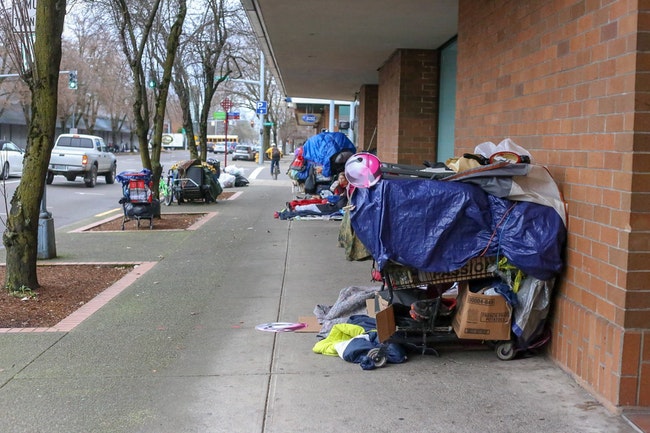 People camp downtown, along the former home of Nordstrom. (Troy Brynelson/Salem Reporter)
People camp downtown, along the former home of Nordstrom. (Troy Brynelson/Salem Reporter)
Oregon cities struggling with homelessness are expected to be one of the biggest beneficiaries under legislation sponsored by House Speaker Tina Kotek. But not every city official fully supports the idea, some worrying it could limit local governments’ control over where homeless shelters are built.
House Bill 4001, one of Kotek’s legislative priorities, is designed to help boost the number of homeless shelters in Oregon by this fall. On Wednesday, Kotek presented the House Human Services and Housing Committee with an updated version of her proposal that said she would increase the legislation’s original $40 million to $60 million as a result of the state’s higher than expected tax collections.
“We’re trying to really take an emergency mindset to the thousands and thousands of Oregonians who are experiencing unsheltered homelessness,” Kotek, a Portland Democrat, told the committee.
The money allocated by the bill would be distributed to local governments and nonprofits through competitive grants. The bill also requires local governments to waive land-use and zoning restrictions that would otherwise prevent the siting of shelters, a provision that expires in July 2021.
Most witnesses supported the bill. Ariel Nelson, lobbyist for the League of Oregon Cities, said that her group supported the new shelter funding. But she said the association wasn’t taking a position on the siting provision because cities disagreed on it.
Rob Drake, city manager for Cornelius, told the committee that while he appreciated the bill’s intent, it could mean homeless shelters being built next to daycares or other sensitive operations as well as commercial districts.
“The big issue for us is losing local control,” he said.
“How much control do we have right now when we have all these camps that are on our sidewalks?” shot back Rep. Cheri Helt, R-Bend.
She specifically referenced the homeless encampment in downtown Salem.
In written testimony, Wilsonville Mayor Tim Knapp raised similar concerns and took issue with how the bill could also allow siting of shelters in rural, unincorporated lands outside of urban growth boundary areas. He wrote that these areas lack public transit or social services and the bill could lead to the creation of “centralized, rural low-income zones.”
Samantha Bayer, associate policy counsel for the Oregon Farm Bureau, said that the bill could permit shelters on farmland in areas without drinking water, fire protection and septic service.
Kotek said she is continuing to work on the bill, and said it only provides one-time money to help get shelters going but expected ongoing operating costs to be an issue.
“I suspect a lot of people are going to be back here in 2021 asking for operation dollars,” she said.
Contact reporter Jake Thomas at 503-575-1251 or [email protected] or @jakethomas2009.









